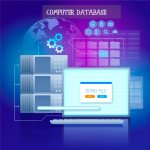Have you ever booked a flight, searched for a product online, or streamed your favorite show? Chances are, you interacted with a computer database—without even realizing it.
In today’s data-driven universe, databases are the invisible threads holding everything together. They don’t shout for attention, but quietly work behind the scenes, ensuring information flows smoothly, securely, and smartly.
Imagine trying to find a book in a library where nothing is categorized. Chaos, right? That’s what the digital world would look like without databases.
A computer database is like a hyper-organized brain—storing, retrieving, and managing massive amounts of information. From your online shopping cart to your medical records, everything is stored, searched, and secured using this brilliant system.
There are many types—relational databases, NoSQL databases, cloud-based databases, and more—but their mission is the same: turn data into answers.
Behind every tech giant lies a powerhouse of databases. Think of:
The smarter the database, the more personalized the experience. Ever noticed how your app “remembers” your preferences? Yep, thank the database!
But where there’s data, there’s risk. Cybercrime is evolving, and databases are juicy targets. That’s why encryption, access control, and backups are non-negotiable in database management.
Modern databases also comply with laws like GDPR and HIPAA, proving that handling data isn’t just technical—it’s ethical.
 Fun Fact: Some databases now even self-heal and auto-update—hello, Artificial Intelligence!
Fun Fact: Some databases now even self-heal and auto-update—hello, Artificial Intelligence!
Gone are the days when data sat inside a dusty hard drive. With cloud databases like Amazon RDS, Google BigQuery, and Microsoft Azure SQL, businesses can access and scale data anytime, anywhere.
The result? Real-time insights. Faster decisions. Borderless operations. It's the kind of magic that keeps businesses agile in a fast-moving world.
While we scroll, search, swipe, and stream, databases work quietly behind the curtain—organizing, updating, and protecting data 24/7.
They’re not flashy. They don’t go viral. But without them, our digital lives would crumble.
So the next time your food delivery app remembers your last order, smile. Somewhere, a database is doing its job—flawlessly.
In today’s data-driven universe, databases are the invisible threads holding everything together. They don’t shout for attention, but quietly work behind the scenes, ensuring information flows smoothly, securely, and smartly.
Databases: The Brains Behind the Buttons
Imagine trying to find a book in a library where nothing is categorized. Chaos, right? That’s what the digital world would look like without databases.
A computer database is like a hyper-organized brain—storing, retrieving, and managing massive amounts of information. From your online shopping cart to your medical records, everything is stored, searched, and secured using this brilliant system.
There are many types—relational databases, NoSQL databases, cloud-based databases, and more—but their mission is the same: turn data into answers.
How Databases Drive the Digital Economy
Behind every tech giant lies a powerhouse of databases. Think of:
 E-commerce platforms tracking inventory and user preferences
E-commerce platforms tracking inventory and user preferences Banks managing billions of transactions securely
Banks managing billions of transactions securely Hospitals storing real-time patient histories
Hospitals storing real-time patient histories Gaming apps recording player progress
Gaming apps recording player progress
The smarter the database, the more personalized the experience. Ever noticed how your app “remembers” your preferences? Yep, thank the database!
Security Matters: Guarding the Goldmine
But where there’s data, there’s risk. Cybercrime is evolving, and databases are juicy targets. That’s why encryption, access control, and backups are non-negotiable in database management.
Modern databases also comply with laws like GDPR and HIPAA, proving that handling data isn’t just technical—it’s ethical.
From Local Storage to Global Clouds
Gone are the days when data sat inside a dusty hard drive. With cloud databases like Amazon RDS, Google BigQuery, and Microsoft Azure SQL, businesses can access and scale data anytime, anywhere.
The result? Real-time insights. Faster decisions. Borderless operations. It's the kind of magic that keeps businesses agile in a fast-moving world.
Final Thoughts: Databases Are the DNA of Digital Systems
While we scroll, search, swipe, and stream, databases work quietly behind the curtain—organizing, updating, and protecting data 24/7.
They’re not flashy. They don’t go viral. But without them, our digital lives would crumble.
So the next time your food delivery app remembers your last order, smile. Somewhere, a database is doing its job—flawlessly.

